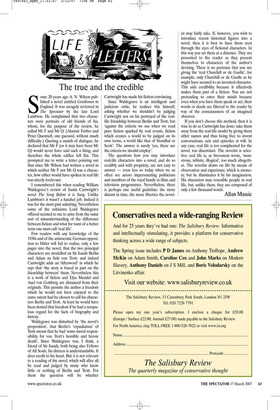The true and the credible
Some 20 years ago A. N. Wilson published a novel entitled Gentlemen in England. It was savagely reviewed in The Spectator by the late Lord Lambton. He complained that two characters were portraits of old friends of his, whom, for the purpose of the review, he called Mr F and Mr Q. (Alastair Forbes and Peter Quennell, one guessed, without much difficulty.) Quoting a snatch of dialogue, he declared that Mr F (or it may have been Mr Q) would never have said such a thing, and therefore the whole edifice fell flat. This prompted me to write a letter pointing out that since Mr Wilson had written a novel in which neither Mr F not Mr Q was a character, how either would have spoken in real life was utterly irrelevant.
I remembered this when reading William Waldegrave’s review of Justin Cartwright’s novel The Song Before it is Sung. Unlike Lambton’s it wasn’t a hatchet job. Indeed it was for the most part admiring. Nevertheless some of the criticisms Lord Waldegrave offered seemed to me to arise from the same sort of misunderstanding of the difference between fiction and what for want of a better term one must call ‘real life’.
Few readers with any knowledge of the 1930s and of the aristocratic German opposition to Hitler will fail to realise, only a few pages into the novel, that the two principal characters are modelled on Sir Isaiah Berlin and Adam zu Solz von Trott; and indeed Cartwright adds an ‘Afterword’ in which he says that ‘the story is based in part on the friendship between’ them. Nevertheless this is a work of fiction and Elya Mendel and Axel von Gottberg are distanced from their originals. This permits the author a freedom which he would not have enjoyed to the same extent had he chosen to call his characters Berlin and Trott. At least he would have been denied that freedom if he had a scrupulous regard for the facts of biography and history.
Waldegrave was disturbed by ‘the novel’s proposition’, that Berlin’s ‘repudiation’ of Trott meant that he had ‘some moral responsibility for von Trott’s horrible and heroic death’. Since Waldegrave was, I think, a friend of Sir Isaiah, both being also Fellows of All Souls, his distress is understandable. It does credit to his heart. But it is not relevant to a reading of the novel, which will after all be read and judged by many who know little or nothing of Berlin and Trott. For them the question will be whether Cartwright has made his fiction convincing.
Since Waldegrave is an intelligent and judicious critic, he realises this himself, asking whether we shouldn’t be judging Cartwright not on his portrayal of the reallife friendship between Berlin and Trott, but ‘against the criteria we use when we read pure fiction sparked by real events, fiction which creates a world to be judged on its own terms, a world like that of Stendhal or Scott’. The answer is surely ‘yes, these are the criteria we should employ’.
The questions how you may introduce real-life characters into a novel, and do so credibly and with propriety, are not easy to answer — even less so today when we so often see actors impersonating politicians and members of the royal family in films and television programmes. Nevertheless, there is perhaps one useful guideline: the more distant in time, the more liberties the novel ist may fairly take. If, however, you wish to introduce recent historical figures into a novel, then it is best to have them seen through the eyes of fictional characters. In this way you set them at a distance. They are presented to the reader as they present themselves to characters of the author’s devising. There is no pretence that you are giving the ‘real Churchill or de Gaulle’, for example; only Churchill or de Gaulle as he might have seemed to an invented character. This aids credibility because it effectively makes them part of a fiction. You are not pretending to enter their minds because even when you have them speak or act, their words or deeds are filtered to the reader by way of the consciousness of an imagined observer.
If you don’t choose this method, then it is wise to do as Cartwright has done: take them away from the real-life model by giving them other names and thus being free to invent conversations, acts and episodes at will. In any case, real life is too complicated for the novel, too discordant. The novelist is selective; real life is, as Stevenson wrote, ‘monstrous, infinite, illogical’, too much altogether. The novelist draws on life by means of observation and experience, which is memory; but he illuminates it by his imagination. His characters may resemble people in real life, but, unlike them, they are composed of only a few thousand words.
Allan Massie


































































































 Previous page
Previous page